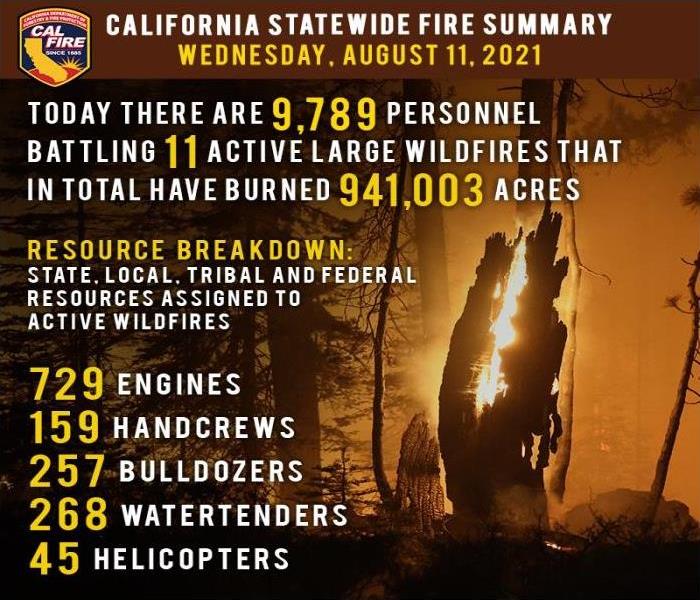We Are in the Midst of Wild Fire Season- Are You Ready?
8/16/2021 (Permalink)
More than 9,700 personnel continue to fight 11 major wildfires/complexes in California.
We all have a responsibility to prevent wildfires through proper maintenance and use of campfires, vehicles, outdoor equipment and more.
Recognize Warnings and Alerts
- Have several ways to receive alerts. Download the FEMA app and receive real-time alerts from the National Weather Service for up to five locations nationwide. Sign up for community alerts in your area and be aware of the Emergency Alert System (EAS) and Wireless Emergency Alert (WEA)- which requires no-sign up.
- Sign up for email updates and follow the latest guidelines about coronavirus from the Centers for Disease Control and Prevention (CDC) and your local authorities to prevent the spread of COVID-19.
- Pay attention to air quality alerts.
Make an Emergency Plan
- Make sure everyone in your household knows and understands what to do if you need to quickly evacuate.
Review Important Documents
- Make sure your insurance policies and personal documents like ID are up to date.
- Make copies and keep them in a secure password protected digital space.
Strengthen your Home
- Use fire-resistant materials to build, renovate or make repairs.
- Find an outdoor water source with a hose that can reach any area of your property.
- Create a fire-resistant zone that is free of leaves, debris or flammable materials for at least 30 feet from your home.
- Designate a room that can be closed off from outside air. Close all doors and windows. Set up a portable air cleaner to keep indoor pollution levels low when smoky conditions exist.
Know your Evacuation Zone
- You may have to evacuate quickly due to a wildfire. Learn your evacuation routes, practice with household, pets, and identify where you will go.
- If you must evacuate to a public shelter, try to bring items that can help protect you and others in the shelter from COVID-19, such as hand sanitizer, cleaning materials, and two masks per person. Children under 2 years old and people who have trouble breathing should not wear masks.
- Follow the instructions from local authorities. They will provide the latest recommendations based on the threat to your community and appropriate safety measures.
Gather Supplies
- Have enough supplies for your household, include medication, disinfectant supplies, masks, pet supplies in your go bag or car trunk. Being prepared allows you to address smaller medical issues at home, alleviating the burden on urgent care centers and hospitals.
- Being prepared allows you to avoid unnecessary excursions and to address minor medical issues at home, alleviating the burden on urgent care centers and hospitals.
- Remember that not everyone can afford to respond by stocking up on necessities. For those who can afford it, making essential purchases and slowly building up supplies in advance will allow for longer time periods between shopping trips. This helps to protect those who are unable to procure essentials in advance of the pandemic and must shop more frequently. In addition, consider avoiding WIC-labeled products so that those who rely on these products can access them.
- If you already have one at home, set aside a respirator, like an N95 respirator, to keep smoke particles out of the air you breathe. Respirators are not meant to fit children. Due to COVID-19, it may be difficult to find respirators. While cloth masks, surgical masks, and dust masks provide protection from exposure to COVID-19, they will not protect you from smoke inhalation. To ensure that healthcare workers have access to N95 respirators, it is best to limit your exposure to smoke rather than buy respirators.
- Be cautious when carrying flammable or combustible household products that can cause fires or explosions if handled wrong, such as aerosols, cooking oils, rubbing alcohol, and hand sanitizer.
- If you already have an N95 mask, use this to protect yourself from smoke inhalation. N95 masks also protect against the spread of COVID-19, however they should be reserved for healthcare workers. If are in a public cleaner air space or shelter, use a mask to help slow the spread of COVID-19.
- Keep your cell phone charged when wildfires could be in your area. Purchase backup charging devices to power electronics.






 24/7 Emergency Service
24/7 Emergency Service
